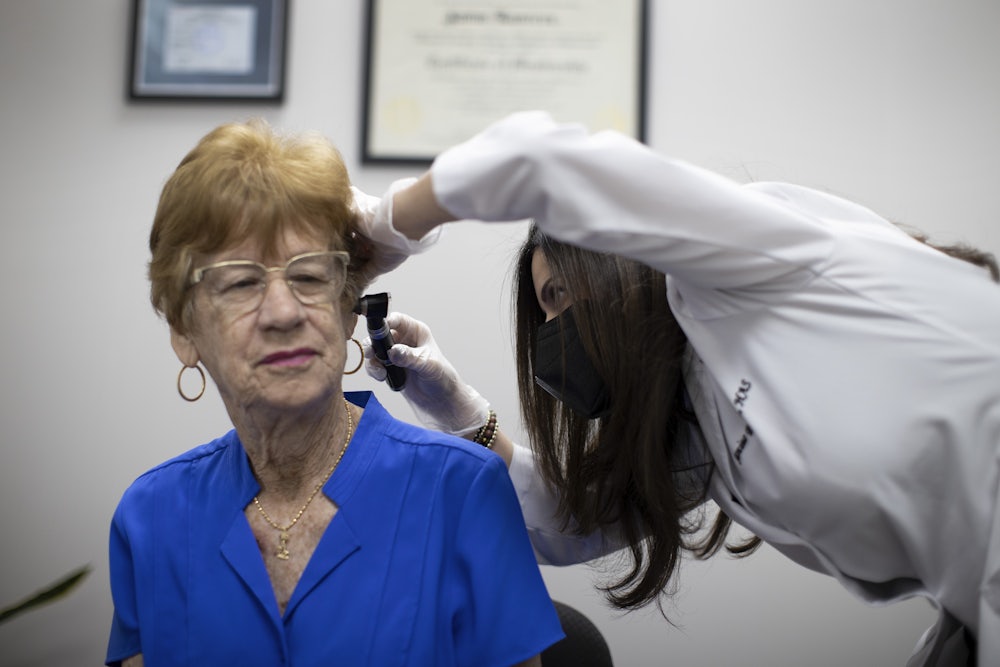About one-third of Americans between the ages of 65 and 74 have lost at least some of their hearing, and after 75 that rises to nearly half. Most of these people don’t get hearing aids; indeed, among those with hearing loss age 70 or older, less than one-third have ever even tried hearing aids. Some of these older people are probably stubborn or in denial, but the biggest obstacle is cost. Hearing aids cost a fortune, and Medicare doesn’t cover them. Typically, a pair of hearing aids will sell for $4,000–$6,000.
Congress did something about this in 2017 when it passed a bipartisan bill allowing for the over-the-counter sale of hearing aids, which, thanks to the advent of smartphones and other advances in consumer electronics, will cost perhaps as little as one-tenth as much as their prescription counterparts. The Over-the-Counter Hearing Aid Act required the Food and Drug Administration to issue regulations for this new category of hearing aids within three years.
The prescription hearing aid industry, led by an oligopoly known as the Big Five, which controls more than 90 percent of the market for hearing aids, failed to stop the bill. But according to a report from the offices of Senators Elizabeth Warren and Chuck Grassley as well as a letter they sent to FDA Commissioner Robert Califf—both released Thursday morning—the Big Five are now flexing their muscle to protect their profits and limit how many hearing-impaired people will be able to use the new over-the-counter products.
In October, more than a year past its deadline, the FDA finally announced its proposed rule, kicking off a four-month public comment period. A final rule is expected soon. According to Warren and Grassley’s report, during the now-closed comment period, the Big Five ginned up more than 400 letters—40 percent of all public comments submitted to the FDA—that sought to limit in various ways how widely the over-the-counter hearing aids can be marketed. The wording in large passages from these letters is identical, including typos. They are the fruit, the report states, of “industry-funded ‘astroturf’ campaigns intended to distort the public response to the FDA rule and sway regulators to adopt changes that would benefit the dominant hearing aid manufacturers, reduce competition, and increase costs for consumers.”
The Big Five companies are Starkey Hearing Technologies, Sonova, WS Audiology, William Demant, and GN Store Nord. They’ve stepped up their lobby efforts even though there doesn’t appear to be any bill to lobby against. Starkey, which as recently as the 2016 election cycle spent only about $137,000 on campaign contributions and nothing on lobbying, has thus far in the 2022 cycle spent about $806,000 on campaign contributions and $626,000 on lobbying. All told, the Big Five have spent about $1.2 million on lobbying during the 2022 cycle.
That’s a big difference from their efforts in 2017, when they spent less than half a million, which wasn’t anywhere near enough. Perhaps they’d grown too comfortable to anticipate any threat. They’ve long been protected from price sensitivity because one-fifth of all U.S. hearing aid sales are to the Veterans Administration, which buys them in bulk. The Big Five had also been free from congressional interference. When the Over-the-Counter Hearing Aid Act came along, they didn’t seem to know how to lobby effectively against it.
“Hearing loss is a medical issue,” huffed Brandon Sawalich—president of Starkey and chairman of the prescription trade group the Hearing Industries Association—in a 2017 op-ed. It is “not a consumer electronics opportunity.” The very question of affordability seemed to offend him.
One problem for the Big Five was that the bill was almost shockingly bipartisan. It passed 94–1 in the Republican-controlled Senate, where it was co-sponsored by Warren and Grassley. It passed unanimously in the Republican-controlled House, where it was co-sponsored by Joseph Kennedy III of Massachusetts and Marsha Blackburn of Tennessee.
Even the Academy of Doctors of Audiology, which previously did not support over-the-counter hearing aids, got behind the bill. Audiologists long had an interest in resisting cheap hearing aids because if you needed to adjust your prescription hearing aid, you had to go to an audiologist; with over-the-counter hearing aids, you just fiddle with an app on your smartphone. But the ADA saw the writing on the wall and got on board. Another reason the ADA came out for the bill was that audiologists, who supply patients with prescription hearing aids, got fed up with paying exorbitant prices for them. According to Matt Stoller, research director at the American Economic Liberties Project, independent audiologists pay three to five times as much as Costco does for the same hearing aid. (I should clarify that the audiologists I’m talking about here are independent audiologists; audiologists directly affiliated with or employed by the prescription hearing aid firms opposed the bill.)
The Big Five’s strategy now is to impose regulatory limits on over-the-counter hearing aids that will limit who can use them. The FDA’s proposed rule would preempt over-the-counter hearing aids from state and local laws that would limit their use; the Big Five wants to keep those state and local impediments. The rule allows over-the-counter hearing aids to be as loud as 120 decibels and does not regulate how much they may amplify sound. A Warren aide told me that the Cochlear Center for Hearing and Public Health at Johns Hopkins signed off on these parameters, but the Big Five say 120 decibels is too loud (they want 110 dB) and that amplification should be limited. Again, the purpose is to limit the market for over-the-counter hearing aids—in this instance, by restricting their use to people who require their hearing aids to be louder. The 2017 law says the over-the-counter hearing aids should be marketed to those with “mild to moderate hearing impairment”; the Big Five fought bitterly to strike the words “to moderate,” but lost.
The Big Five say they’re only trying to make the new products as safe as possible, but Warren and Grassley say they’re trying to restrict the population that can use them. “The only way you’re going to die from using a hearing aid is if you eat it,” Stephanie Czuhajewski, the ADA’s executive director, told me.
Bringing down the cost of hearing aids by enabling the wide dissemination of over-the-counter products is important not only because it will make the devices affordable to people who can’t hear but also because it will make them affordable to Medicare should it sometime in the future cover hearing aids. The Build Back Better bill that died last year in the Senate included a provision to expand Medicare coverage to hearing, vision, and dentistry. As I wrote in September, hearing aids and eyeglasses were the most important of these. (Full disclosure: I have a mild case of glaucoma, am slightly hearing-impaired, and will be Medicare-eligible next year.) Hearing deficits in particular are horribly isolating for the elderly. Unaddressed, they can accelerate cognitive deterioration. I’ve seen this happen in people I love.
Congress has no plan at the moment to expand Medicare to cover hearing aids, but Senator Bernie Sanders, who inserted expanded Medicare coverage into the Build Back Better bill, will surely bring it up again. When he does, the price will have to be reasonable on hearing coverage for it to have any chance of passing. Over-the-counter hearing aids should help a lot in that regard. The Big Five aren’t stupid; they can see they may be priced out of the private market and eventually out of a Medicare market. So they’re throwing everything they’ve got to choke off the competition. Even with their stepped-up effort to influence the FDA, though, I think their days are numbered. This is one fight the good guys may win.






